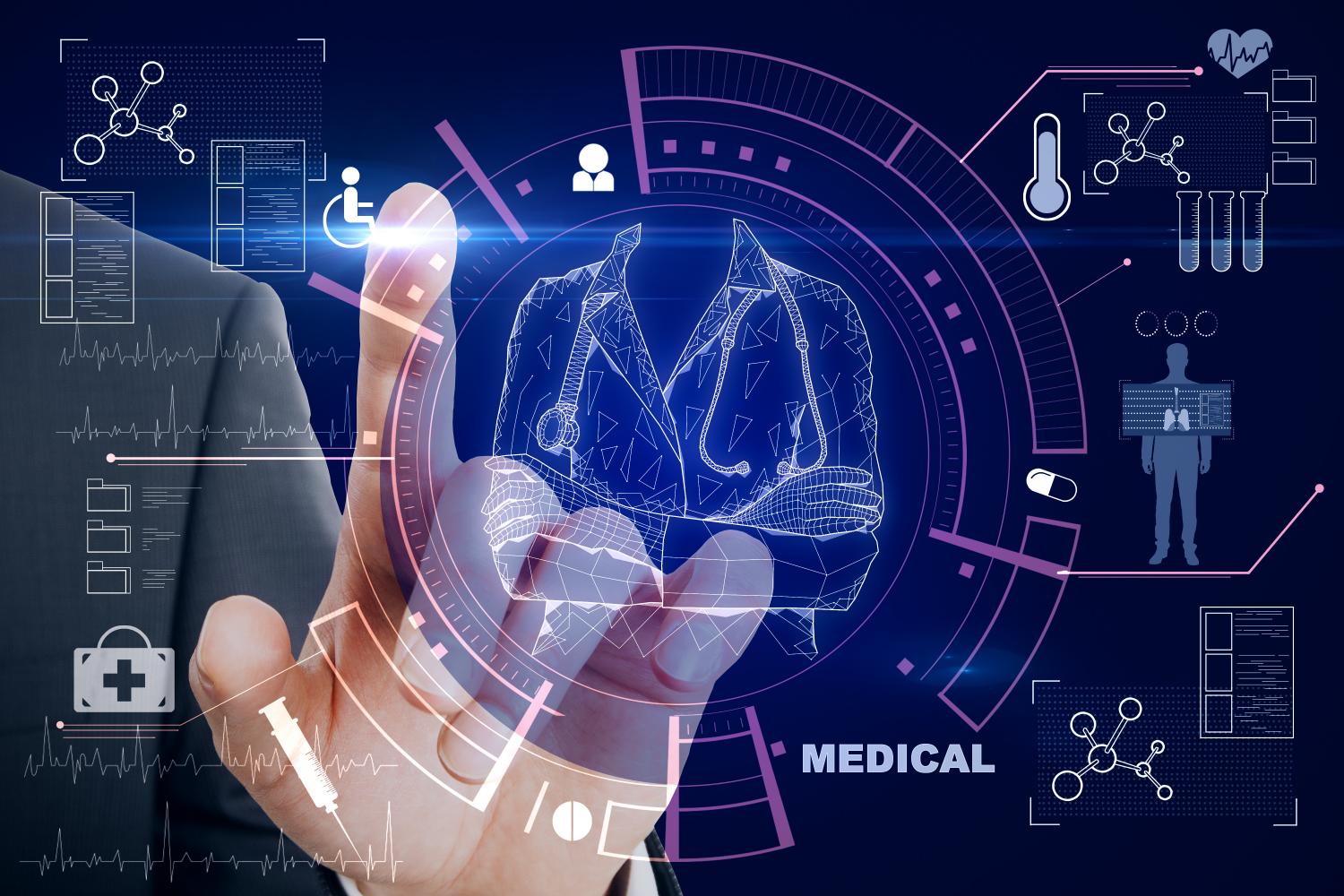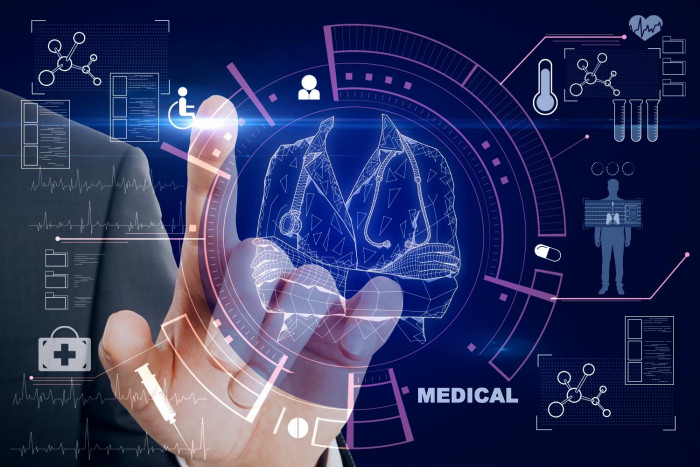Source

 A challenge in promoting AI in key industries and infrastructure is the lack of skilled workforce to support its use in the business sector.
A challenge in promoting AI in key industries and infrastructure is the lack of skilled workforce to support its use in the business sector.
Thailand’s healthcare sector is leveraging artificial intelligence (AI), including generative AI, to bolster the medical sector.
This includes using AI to offload physicians’ work, make more accurate diagnoses, provide better patient treatment and address the shortage of specialists.
Public hospitals recently teamed up with state agencies and local startups to build AI-based medical products and services to pave the way for the export of medical solutions to the Asia-Pacific region.
In August, the Faculty of Medicine at Siriraj Hospital under Mahidol University forged a partnership with local AI startup Cariva (Thailand) to use AI to enhance medical treatment and offer innovative medical products and services.
The collaboration aims to strengthen Thailand’s position as a medical hub and assist in the export of AI health-tech innovations to Asia-Pacific.
HIGH TOUCH WITH HIGH TECH
Dr Cherdchai Nopmaneejumruslers, deputy dean for service innovation and organisational values at Siriraj Hospital, said the project will develop medical data to strengthen the AI medical ecosystem in Thailand, in compliance with ethics regulations and the Personal Data Protection Act.
Dr Cherdchai said using AI can help short-handed medical staff who are overloaded with work by automating certain tasks.
“This is not only a high-tech collaboration, but also high touch as doctors will have more time with patients,” he said.
The partnership with Siriraj will support product commercialisation in the market, said Siwadol Matayakul, chief executive and co-founder of Cariva (Thailand) Co.
The collaboration covers four projects. Among them is the establishment of “SiCAR Ai Lab” last month, a platform for testing and developing medical AI.
The lab should give Thai startups the opportunity to develop more efficient medical AI, leading to better health diagnosis outcomes for patients as well as strengthening the medical AI ecosystem, he said.
The second project is the company’s partnership with Mahidol University’s Radiology Department to develop AI that can read and analyse images such as tumours or organ masses.
Cariva developed AI that can measure the mass of organs and tumours. It can generate 3D images that shorten the preparation time for medical staff.
Mr Siwadol said Cariva’s AI was initially developed using foreign data. The partnership with the radiology department will help the AI system adjust its operations to fit the data of local patients, he said.
Cariva also plans to co-develop with the department AI that can advise radiologists for X-rays or computerised tomography scans (CT scans) based on individual patients’ medical records.
The company also joined with Siriraj Genomics centre to develop new products, including NanoPGx, a nanopore-based pharmacogenomics offering. This high-precision process can analyse genes with the potential for medicine allergies, serving both locals and foreigners.
DATA SHARING IS KEY
In August, the National Science and Technology Development Agency teamed up with the Public Health Ministry’s Department of Medical Services and Ramathibodi Hospital’s Faculty of Medicine, Mahidol University, to promote medical AI data sharing.
Dr Chagriya Kitiyakara, director of the medical innovations development centre of Ramathibodi Hospital, said AI is playing a key role in treatment.
He said providing more data to train AI machines will accelerate the creation of a medical AI ecosystem in Thailand.
The project on medical AI data sharing involves R&D of open medical data for AI developers to access certain information in order to develop medical AI innovations.
Dr Chayanin Nitiwarangkul in the department of diagnostic and therapeutic radiology at Ramathibodi Hospital said the data sharing will enable AI to analyse X-ray, CT and magnetic resonance imaging scans of many illnesses, including lung cancer and prostate cancer.
This should speed up the time needed to analyse the data and can help remote hospitals facing a shortage of specialists, said Dr Chayanin.
Chai Wutiwiwatchai, executive director of the National Electronics and Computer Technology Center, said AI is playing a larger role in drug discovery, personal health trends, electronic health records and robotic surgery. The open data initiative will pave the way for local innovation use cases and the development of medical startups, he said.
Sompong Klaynongsruang, director of Program Management Unit for Human Resources & Institutional Development, Research and Innovation, said the institution offered a total of 120 million baht to fund this medical AI data sharing project for three years.
In a related matter, the Electronic Transactions Development Agency recently signed a memorandum of understanding with Mahidol University to pilot the use of AI in the medical sector on good governance.
Dr Dilok Piyayotai, dean of the Faculty of Medicine, Thammasat University, said the Thai medical industry is adopting AI, but utilisation is still focused on narrow wedges, such as X-rays and robotic works.
“We’re exploring a partnership with international universities to exchange AI knowledge and teach our students,” he said.
The university plans to introduce a programme for two bachelor’s degrees for medical students requiring study for seven years, with the first six years for a medical degree and another year for an AI degree.
“We’re at a critical juncture. AI could be the miracle that solves a lot of the challenges we face, or it could be the menace that we are afraid of because it will destroy humanity,” said Dr Rubin Pillay, chief innovation officer for the University of Alabama at Birmingham Health System.
AI should make it easier for people to access healthcare in remote areas through AI-enabled telemedicine, streamlining administrative tasks and reducing heavy workloads for doctors, he said.
“We use AI to reduce disparities, not just racial or geographic, but all disparities. AI can make healthcare for the disabled equally as accessible as care for able-bodied persons,” said Dr Pillay.
HUMANS STILL NEEDED
“Progress in AI technology has made many jobs vulnerable to automation, but it will still be many decades before AI can outperform humans,” Thepchai Supnithi, vice-president of the Artificial Intelligence Association of Thailand, said at a seminar titled “AI: A Turning Point or the End Point of Humanity?” held by Thailand Science Research and Innovation (TSRI).
Skilled workers are needed in various industries to promote an AI-based economy, he said.
From 2020 to 2024, the association estimates demand for more than 47,000 skilled workers in Thailand in 23 occupational fields.
The top three jobs with the highest demand are 16,377 data scientists, 10,286 aerospace engineers, and 5,759 AI specialists.
In 2022, Thailand’s investment in AI totalled 639 million baht, increasing by more than 50% from 2021. There are 200 AI startups in Thailand.
Assoc Prof Komgrit Leksakul, director of the Brain Power and Knowledge Institutes Development division at TSRI, said the healthcare industry now uses AI or robots to assist doctors in detecting abnormalities in radiographic images and to provide access to services, even in remote areas.
Thailand is prepared to adapt and utilise digital technology that generated an economic value of up to 1 trillion baht in 2021, ranking second in Asean, according to TSRI.
Chinawut Chinaprayoon, assistant director of the Digital Economy Promotion Agency, said the agency is promoting AI in key industries and infrastructure. However, the challenge is a dearth of skilled workers to support AI use in the business sector, he said.
Thailand also needs to enhance the skill sets of specialised personnel and prepare the data infrastructure, said Mr Chinawut.
Ome Sivadith, national technology officer of Microsoft (Thailand) Ltd, said the development of digital technology will transform roles. In addition to data scientists or engineers, individuals with versatile capabilities now have more opportunities to engage and communicate with AI tools, he said.
Employees will need AI analytical skills and the ability to evaluate whether AI’s actions are correct and appropriate. People need to coexist intelligently with AI and adapt quickly to new learning, said Mr Ome.
Developers in Thailand should leverage technology to create Thai-specific AI models or use cases to promote workforce development and skill-building for various sectors, he said.
The skill development should focus on creating AI experts who focus on R&D, AI engineers to train AI models, and AI designers for solving related problems, said Mr Ome.
AUGMENTED REALITY
According to global consultancy McKinsey & Co’s article “Tackling healthcare’s biggest burdens with generative AI”, the technology has the potential to reimagine much of the healthcare industry in ways we have not seen with previous technologies.
Once generative AI matures, it could converge with other emerging technologies, such as virtual and augmented reality, to transform healthcare service offerings, according to the article.
For example, a healthcare provider could license its likeness and voice to create a branded visual avatar with whom patients could interact.
According to the article, related parties in the healthcare sector should give top priority to responsibility and safety when using these advanced technologies.
Protecting patient privacy, creating the conditions for equitable clinical outcomes, and improving the experience of healthcare providers should be their top goals, noted McKinsey.


